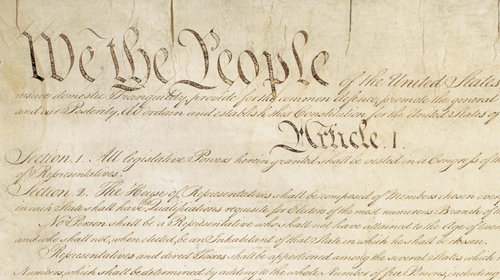
Update: The administration has asked Sen. Schumer to reintroduce the Free Flow of Information Act, Rep. John Conyers (D-Mich.) just announced that he will do so in the House, and Rep. Ted Poe (R-Texas) introduced a similar bill today. The administration should certainly be commended for taking proactive steps to prevent this from happening again. That said, the administration can’t get in the way this time. The demand in 2009 for a broad exception for national security leaks cases delayed the bill, and tempered enthusiasm among Democrats for the bill in the face of strong opposition by certain Republicans. The 2013 bill must protect against what happened here with the AP, and it’s not clear that the 2009 White House compromise would have done so.
Although the president's press secretary noted yesterday then-Senator Obama's support for a federal shield law to protect reporters from having to disclose their sources, he failed to mention how the White House deep-sixed a comprehensive shield bill back in 2009. That bill could have prevented the extraordinary Associated Press subpoena, which was disclosed this week.
Back in 2009, various stakeholders—including Republicans in the House, Sens. Charles Schumer (D-N.Y.) and Arlen Specter (D-Pa.), and a broad coalition of free press and public interest groups—came together to support the Free Flow of Information Act. Although not perfect, the original bill contained express safeguards requiring the administration to exhaust all other means of obtaining the information sought and to tailor subpoenas narrowly, along with other safeguards to preserve source anonymity.
While initially backing the legislation, the administration abruptly reversed course in late 2009, demanding that the bill contain what amounted to an exemption for national security leak cases and severely limiting judicial discretion under the measure. The bill died and has yet to be resurrected.
If there ever were a time to resurrect the federal shield law, it is now.
Although the details are still trickling out, it's clear that a Justice Department leak investigation sought the dial-out records of 20 phone lines belonging to the AP and its reporters. The request covered both the personal mobile and home phones of targeted journalists, as well as office numbers for the AP in New York, Washington, Hartford, and the House of Representatives' press gallery. More than 100 reporters work at the offices subject to the subpoenas, and the information pulled covered two months. Perhaps most striking, notice of the subpoena was delayed—meaning that the AP had no opportunity to go to court to contest it before the DOJ secured the records.
I haven't been able to find any cases of similar sweep. In one of the more recent cases involving a leak subpoena for phone records (involving a tip to The New York Times that the offices of two Islamic charities suspected of funding terrorism were about to be raided), the government notified the news outlet in advance, negotiated with the Times at length, and only sought a subpoena as a last resort. The scope of the subpoena was modest compared to the AP request, covering only a couple of weeks of records and only two journalists. That's a far cry from what happened here.
The notion of a reporter shield or privilege isn't to protect journalists; it's to protect the public. When the Bill of Rights was being drafted, America had a vibrant mass media. Indeed, it even had the 18th century equivalent of the blogger (the proverbial "lonely pamphleteer"). The drafters were well aware of the power of a free media to restrain government excess and to undermine the authoritarian impulse. Many recalled, for instance, the case of John Zenger, the colonial printer charged with libel for printing a periodical critical of the New York governor. That prosecution led in part to calls for express protection for freedoms of press and speech in the Constitution.
An essential element of the journalist's toolkit is the anonymous source, and this is doubly true in the context of national security reporting. As the government itself acknowledges, the current classification system for sensitive national security information is deeply flawed. Not only is there little incentive not to classify something, too often national security is used as an excuse to prevent disclosure of information about embarrassing or illegal activities.
Absent "leaks," we would never have learned about the Bush administration's warrantless wiretapping program, its use of CIA "black sites," and the unlawful torture of detainees in the Iraq War and the so-called "war on terror." In more recent days, "leaks" have been instrumental in the public disclosure of the Obama administration's cyberattacks against Iran and its targeted killing program.
And yet, despite the clear public interest in revealing this government misconduct, the Obama administration—the "most transparent administration in history"—will have as one of its legacies an unprecedented crackdown on the unauthorized disclosure of classified information. It has prosecuted many more leakers (twice as many as all previous administrations combined), and pursued leak investigations more aggressively than anyone else. The time is ripe for a federal law that would protect reporters from having to disclose their sources (with limited exceptions to ensure due process for criminal defendants and to prevent actual and imminent harm).
The AP scandal casts this need in stark relief.
Learn more about the freedom of the press and other civil liberty issues: Sign up for breaking news alerts, follow us on Twitter, and like us on Facebook.

